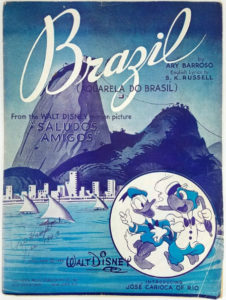
Lore has it that, when Walt Disney and his “grupo” got to Rio de Janeiro (presumably in September, 1941), they attended a soiree given in Walt’s honor. A local band–and not a very good one–played for this function, and one of the tunes they played was “Aquarela do Brasil”, a song written by Ary Barroso. Walt liked the tune, badly-played though it might have been. And when he heard it played well–by the composer, no less–he said something to the effect that that was what he wanted!
Walt Disney got what he wanted!
 “Aquarela do Brasil”–meaning “A Watercolor of Brazil”–had been published in the summer of 1939,and had appeared in a Rio revue at that time. It was also recorded, in a long version that took up both sides of a ten-inch record, by Francisco Alves for the Odeon label.
“Aquarela do Brasil”–meaning “A Watercolor of Brazil”–had been published in the summer of 1939,and had appeared in a Rio revue at that time. It was also recorded, in a long version that took up both sides of a ten-inch record, by Francisco Alves for the Odeon label.
It is likely that the Brazilian publisher of “Aquarela do Brasil” had already been in touch with New York publishing houses, even before Disney got back from his goodwill journey.
On September 26 of that year, Enric Madriguera–a violinist and bandleader who was intimately associated with Latin-American music–took a band into Victor’s studio in New York, and recorded six sides–one of which was “Brazil”–the American title for “Aquarela do Brasil”. This version was strictly instrumental, although its label does credit English lyrics.
On the last day of that calendar year, Columbia’s studios at Liederkrantz hall in New York City resounded with the music of Xavier Cugat and his Waldorf-Astoria Orchestra. “Cugie’s” version uses the verse of the song, sung in Portuguese. For the most part, however, it’s a lush instrumental, with a choir used mainly as another section of the orchestra, alongside the brass, saxes, strings and rhyrhm (including Cuban percussion, which he man-in-the-street would rake to be genuinely Cuban.)
This record was held back a few months, but it was eventually released in the summer of 1942–still before “Saludos Amigios” came out. into the theaters.
Cugat’s version contended against a newly-recorded version payed, mostly in Swing style, by Jimmy Dorsey on a Decca record. Dorseys’ side may have been arranged by Salvaedor “Tutti” Camarata, who came up with format that would showcase, in turn, romantic baritone Bob Eberly the leader-man and his alto sax, and Helen O’Connell, rhythm vocalist.
These three versions helped the song become a well-loved standard in the United States,. The piece became a standard, and was revived, in various styles at various times–including versions by the Coasters (1956) and by the DeFranco Family (1974).
 The “hook”of the song–the part that grabbed the listener–was actually a “vamp”–a two-bar phrase that was used to lead into the chorus. And that leads into a tale that I’d like to tell. I heard this right “from the horse’s mouth”, as it was.
The “hook”of the song–the part that grabbed the listener–was actually a “vamp”–a two-bar phrase that was used to lead into the chorus. And that leads into a tale that I’d like to tell. I heard this right “from the horse’s mouth”, as it was.
In 1994, a good friend of mine was playing an afternoon gig with a pickup band on the day of the World Cup final between France and Brazil. The customers wished to be apprised of the score, if there should be one. So, somebody must have been monitoring the television coverage of the important soccer match.
And, whenever it was requested, the leader of this alfresco combo would announce the score. And when he mentioned the name “Brazil”, the sidemen broke into the vamp associated with that song. Again and again!
This was not the only Brazilian song to tickle Walt’s fancy–as we shall see.


 James Parten has overcome a congenital visual disability to be acknowledged as an expert on the early history of recorded sound. He has a Broadcasting Certificate (Radio Option) from Los Angeles Valley College, class of 1999. He has also been a fan of animated cartoons since childhood.
James Parten has overcome a congenital visual disability to be acknowledged as an expert on the early history of recorded sound. He has a Broadcasting Certificate (Radio Option) from Los Angeles Valley College, class of 1999. He has also been a fan of animated cartoons since childhood.












































Also featured in and inspired the title of one of my favorite films, Brazil (1985).
You don’t mention Terry Gillium’s use of the song in the movie “Brazil?”
My favorite version of this song was Michael Nesmith’s (formerly of The Monkees) version on his album, Tropical Campfires. He talks about Saludos Amigos in the liner notes.
You probably meant the Ritchie Family’s disco rendition from 1975 which was a big club hit, the DeFranco family never recorded the song.
With a few exceptions, about half of the group arrived on August 14, and the other half (including Walt) on August 16. I have all the Rio de Janeiro immigration cards, which I downloaded from a genealogy website. I could not find Bodrero’s yet, though. I can send them to you if you want.